Module 10 On the radio Unit 2 Reading 课件(共21张ppt) 外研版八年级下册
文档属性
| 名称 | Module 10 On the radio Unit 2 Reading 课件(共21张ppt) 外研版八年级下册 |
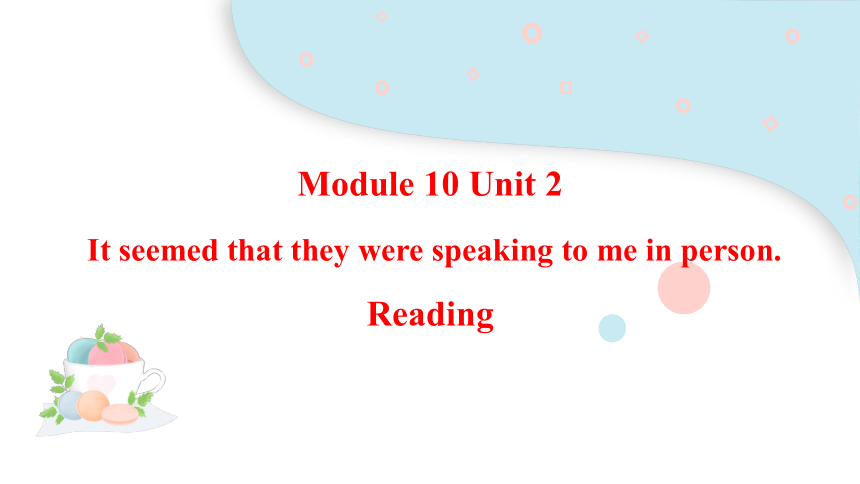
|
|
| 格式 | pptx | ||
| 文件大小 | 21.1MB | ||
| 资源类型 | 教案 | ||
| 版本资源 | 外研版 | ||
| 科目 | 英语 | ||
| 更新时间 | 2024-11-23 00:00:00 | ||
图片预览


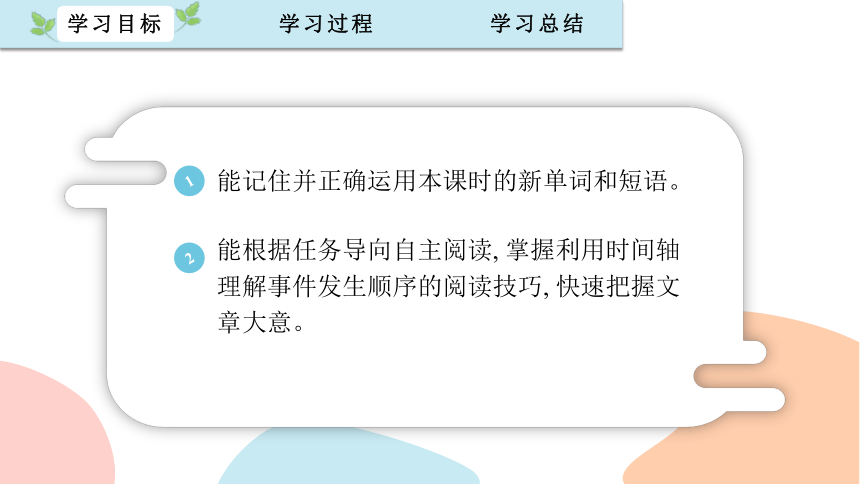
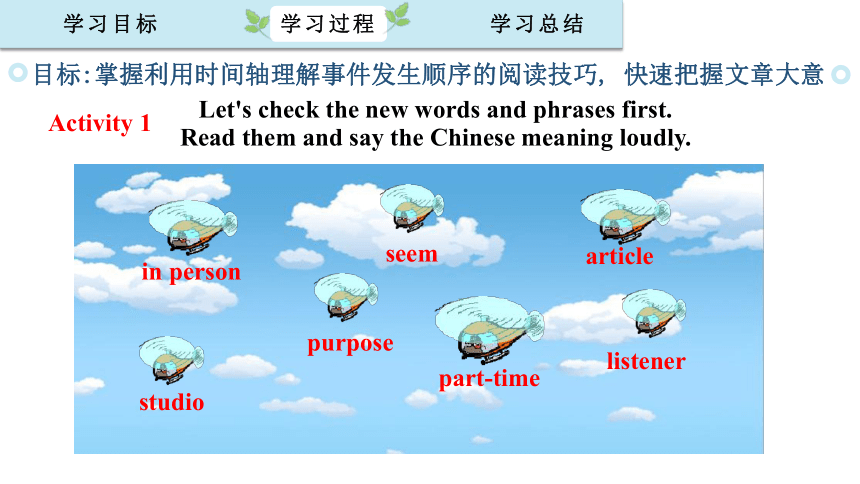
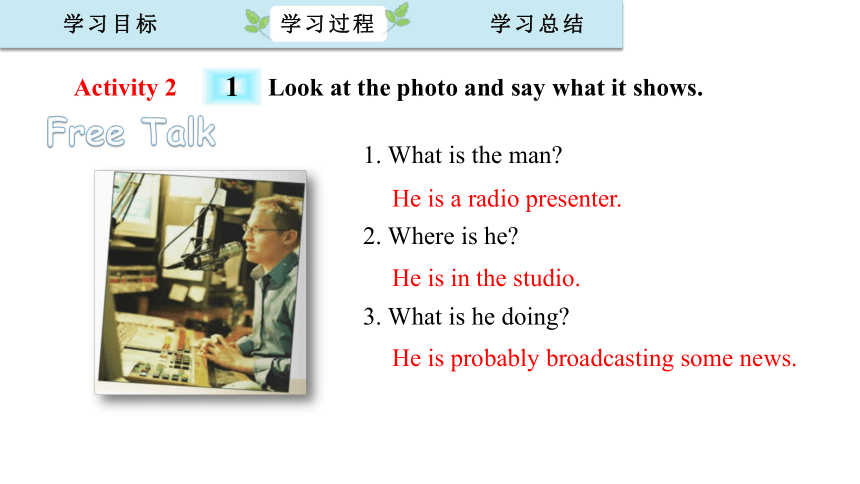
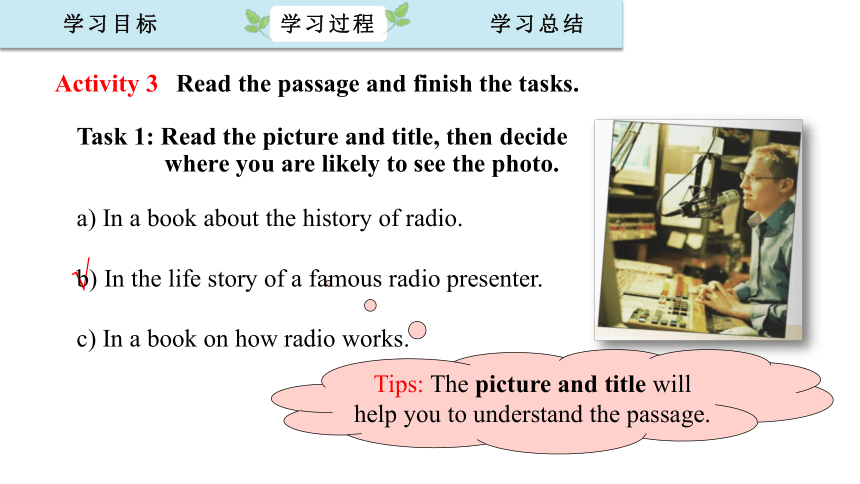

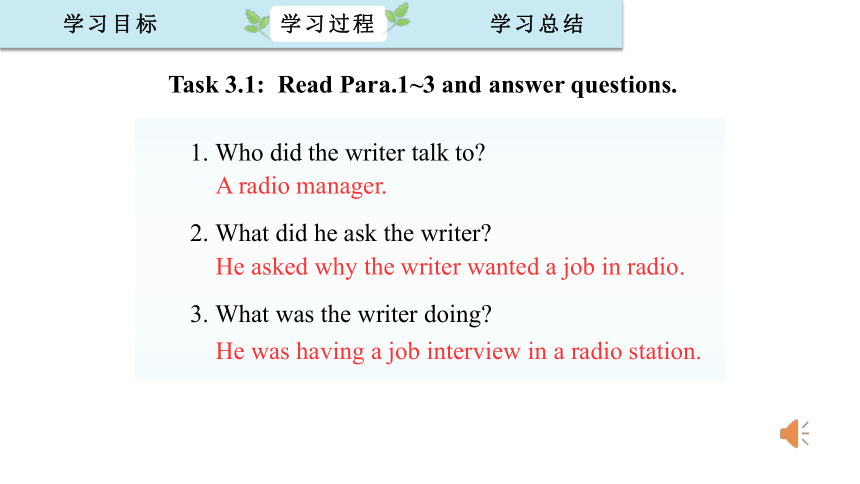
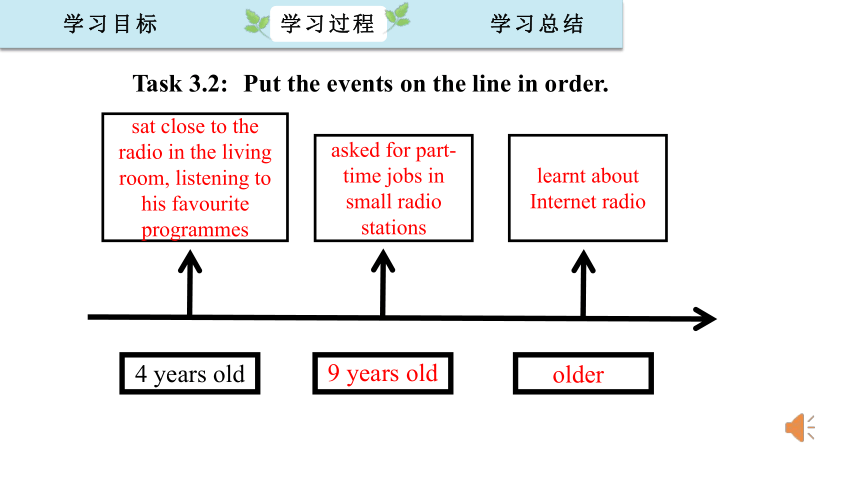
文档简介
(共21张PPT)
Module 10 Unit 2
It seemed that they were speaking to me in person.
Reading
Let's enjoy a video
能根据任务导向自主阅读, 掌握利用时间轴理解事件发生顺序的阅读技巧, 快速把握文章大意。
1
2
能记住并正确运用本课时的新单词和短语。
目标:掌握利用时间轴理解事件发生顺序的阅读技巧, 快速把握文章大意
Activity 1
Let's check the new words and phrases first.
Read them and say the Chinese meaning loudly.
studio
seem
article
part-time
purpose
in person
listener
Activity 2
Free Talk
1
Look at the photo and say what it shows.
1. What is the man
2. Where is he
3. What is he doing
He is a radio presenter.
He is in the studio.
He is probably broadcasting some news.
Activity 3
Read the passage and finish the tasks.
Tips: The picture and title will help you to understand the passage.
√
Task 1: Read the picture and title, then decide
where you are likely to see the photo.
a) In a book about the history of radio.
b) In the life story of a famous radio presenter.
c) In a book on how radio works.
Task 2: Read the passage quickly and answer the questions.
1.Who old was the writer
2.What is the passage mainly about
Fifteen.
The writer wants a job in radio.
Task 3.1: Read Para.1~3 and answer questions.
1. Who did the writer talk to
2. What did he ask the writer
3. What was the writer doing
A radio manager.
He asked why the writer wanted a job in radio.
He was having a job interview in a radio station.
Task 3.2: Read Para.4~6 and draw a timeline.
4 years old
9 years old
older
Put the events on the line in order.
asked for part-time jobs in small radio stations
sat close to the radio in the living room, listening to his favourite programmes
learnt about Internet radio
Task 3.3: Read Para.4~6 again and answer the questions.
1. Why did the writer want the job in radio
2. How did he feel when he listened to the radio
3. What did the writer do in Internet radio
Because he has always loved the radio.
It seemed that the presenters were speaking not to lots of listeners but to him in person.
He played his favourite music from his father’scomputer, talked about life at school.
Task 3.4: Read Para.7~12 and answer questions.
1. What question do all the presenters need to answer
before they begin work
2. What’s the purpose of this question
“What did you have for breakfast ”
The purpose is to check the sound level.
3
Complete the sentences.
1. The writer met _______________ in a radio station.
2. The manager asked why he wanted a job ________.
3. At the age of four, the writer _________________________________,
listening to his favorite programmes.
4. At the age of nine, he asked for part-time jobs in ___________________.
5. As he grew older, he learnt about ____________.
6. This was how the writer's _________________ began.
a radio manager
in radio
sat close to the radio in the living room
small radio stations
Internet radio
first real job in radio
Complete the passage with the correct form of the words and expressions in the box.
Peter (1)______ to be very happy with his new job. He works in the (2) ______ of a local radio station. He is lucky that (3) ___________ only twenty he is doing something he loves and has a real (4)________. Every morning when he starts work, he does a sound check and then he looks for interesting newspaper (5)________ to talk about on the show. The (6) ________ can phone in to talk to Peter or they can send emails to ask him to play their favourite songs. At the end of the show, he closes down all the equipment and goes home.
purpose
articles
listeners
seems
studio
at the age of
article at the age of listener purpose seem studio
4
Activity 4
Work in groups. Find out some language points that you think are important and share their use with your classmates and give some examples.
Language points:_______________________
_____________________________________
_____________________________________
____________________________________
___________________________________
Language points
1. The radio manager looked down at me.
look down at 意为“低头看……”
相反词组: look up at
e.g. We looked down at the city from the top of the hill.
【拓展】look的其他常考短语
look for 寻找 look after 照顾;照看
look forward to 期盼 look up 查寻
2. Shouldn’t you be at school
Don’t you agree with us
难道你不同意我们吗?(表示责备)
Aren’t these pictures beautiful
难道这些照片不美吗?(表示赞赏)
这是一个否定疑问句, 表示惊讶的语气。这种句式还可以表示责备或赞赏等语气。
3. I still remember, when I was four years old, I sat close to the radio
in the living room, listening to my favourite programmes and to
the voices of my favourite presenters.
1) remember doing sth. “记得做过某事”
remember to do sth. “记着去做某事”
e.g. I remembered turning off the lights when I left the room.
Just remember to bring your schoolbag.
2) close to 临近,靠近 sit close to sth 坐在…的旁边
close在这里是形容词, 指“离得近; 距离短”它还有“关上”的意思。e.g. The tables were close to the wall.
Slowly he closed the book.
3) listening to my favourite programmes, and to the voices of my
favourite presenters 是现在分词短语,在句中作伴随状语, 表示
伴随情况。伴随状语是指的动作伴随主句动作同时发生。
e.g. Tom stood there for half an hour, watching the basketball game.
my favourite programmes 和 the voices of my favourite presenters 并列作listening to的宾语, and 后面省略了listening。
4. It seemed that they were speaking not to lots of listeners but to me
in person.
1) seem动词,意为“看来;似乎”,常见用法有:
a. It seems that 从句
e.g. It seems that he doesn’t have any choices.
e.g. It seemed to me that she was interested in the book.
b. seem to do sth.
e.g. Mr. Wu seemed to be angry this morning.
c. seem +形容词/名词
e.g. Tony seems a smart boy.
2) not…but…意为“不是……而是……”,连接并列的成分。
e.g. My father goes to work not by bus but on foot.
e.g. Not Lingling but Daming is the monitor.
3) in person 意为“亲自;本人”,在句中作状语。
e.g. You’d better ask Mr Green about it in person.
Fill in the blanks and retell the passage.
how old
to the voice of his favorite presenters
a small radio station
Internet radio
sound level
Retelling
time
Module 10 Unit 2
It seemed that they were speaking to me in person.
Reading
Let's enjoy a video
能根据任务导向自主阅读, 掌握利用时间轴理解事件发生顺序的阅读技巧, 快速把握文章大意。
1
2
能记住并正确运用本课时的新单词和短语。
目标:掌握利用时间轴理解事件发生顺序的阅读技巧, 快速把握文章大意
Activity 1
Let's check the new words and phrases first.
Read them and say the Chinese meaning loudly.
studio
seem
article
part-time
purpose
in person
listener
Activity 2
Free Talk
1
Look at the photo and say what it shows.
1. What is the man
2. Where is he
3. What is he doing
He is a radio presenter.
He is in the studio.
He is probably broadcasting some news.
Activity 3
Read the passage and finish the tasks.
Tips: The picture and title will help you to understand the passage.
√
Task 1: Read the picture and title, then decide
where you are likely to see the photo.
a) In a book about the history of radio.
b) In the life story of a famous radio presenter.
c) In a book on how radio works.
Task 2: Read the passage quickly and answer the questions.
1.Who old was the writer
2.What is the passage mainly about
Fifteen.
The writer wants a job in radio.
Task 3.1: Read Para.1~3 and answer questions.
1. Who did the writer talk to
2. What did he ask the writer
3. What was the writer doing
A radio manager.
He asked why the writer wanted a job in radio.
He was having a job interview in a radio station.
Task 3.2: Read Para.4~6 and draw a timeline.
4 years old
9 years old
older
Put the events on the line in order.
asked for part-time jobs in small radio stations
sat close to the radio in the living room, listening to his favourite programmes
learnt about Internet radio
Task 3.3: Read Para.4~6 again and answer the questions.
1. Why did the writer want the job in radio
2. How did he feel when he listened to the radio
3. What did the writer do in Internet radio
Because he has always loved the radio.
It seemed that the presenters were speaking not to lots of listeners but to him in person.
He played his favourite music from his father’scomputer, talked about life at school.
Task 3.4: Read Para.7~12 and answer questions.
1. What question do all the presenters need to answer
before they begin work
2. What’s the purpose of this question
“What did you have for breakfast ”
The purpose is to check the sound level.
3
Complete the sentences.
1. The writer met _______________ in a radio station.
2. The manager asked why he wanted a job ________.
3. At the age of four, the writer _________________________________,
listening to his favorite programmes.
4. At the age of nine, he asked for part-time jobs in ___________________.
5. As he grew older, he learnt about ____________.
6. This was how the writer's _________________ began.
a radio manager
in radio
sat close to the radio in the living room
small radio stations
Internet radio
first real job in radio
Complete the passage with the correct form of the words and expressions in the box.
Peter (1)______ to be very happy with his new job. He works in the (2) ______ of a local radio station. He is lucky that (3) ___________ only twenty he is doing something he loves and has a real (4)________. Every morning when he starts work, he does a sound check and then he looks for interesting newspaper (5)________ to talk about on the show. The (6) ________ can phone in to talk to Peter or they can send emails to ask him to play their favourite songs. At the end of the show, he closes down all the equipment and goes home.
purpose
articles
listeners
seems
studio
at the age of
article at the age of listener purpose seem studio
4
Activity 4
Work in groups. Find out some language points that you think are important and share their use with your classmates and give some examples.
Language points:_______________________
_____________________________________
_____________________________________
____________________________________
___________________________________
Language points
1. The radio manager looked down at me.
look down at 意为“低头看……”
相反词组: look up at
e.g. We looked down at the city from the top of the hill.
【拓展】look的其他常考短语
look for 寻找 look after 照顾;照看
look forward to 期盼 look up 查寻
2. Shouldn’t you be at school
Don’t you agree with us
难道你不同意我们吗?(表示责备)
Aren’t these pictures beautiful
难道这些照片不美吗?(表示赞赏)
这是一个否定疑问句, 表示惊讶的语气。这种句式还可以表示责备或赞赏等语气。
3. I still remember, when I was four years old, I sat close to the radio
in the living room, listening to my favourite programmes and to
the voices of my favourite presenters.
1) remember doing sth. “记得做过某事”
remember to do sth. “记着去做某事”
e.g. I remembered turning off the lights when I left the room.
Just remember to bring your schoolbag.
2) close to 临近,靠近 sit close to sth 坐在…的旁边
close在这里是形容词, 指“离得近; 距离短”它还有“关上”的意思。e.g. The tables were close to the wall.
Slowly he closed the book.
3) listening to my favourite programmes, and to the voices of my
favourite presenters 是现在分词短语,在句中作伴随状语, 表示
伴随情况。伴随状语是指的动作伴随主句动作同时发生。
e.g. Tom stood there for half an hour, watching the basketball game.
my favourite programmes 和 the voices of my favourite presenters 并列作listening to的宾语, and 后面省略了listening。
4. It seemed that they were speaking not to lots of listeners but to me
in person.
1) seem动词,意为“看来;似乎”,常见用法有:
a. It seems that 从句
e.g. It seems that he doesn’t have any choices.
e.g. It seemed to me that she was interested in the book.
b. seem to do sth.
e.g. Mr. Wu seemed to be angry this morning.
c. seem +形容词/名词
e.g. Tony seems a smart boy.
2) not…but…意为“不是……而是……”,连接并列的成分。
e.g. My father goes to work not by bus but on foot.
e.g. Not Lingling but Daming is the monitor.
3) in person 意为“亲自;本人”,在句中作状语。
e.g. You’d better ask Mr Green about it in person.
Fill in the blanks and retell the passage.
how old
to the voice of his favorite presenters
a small radio station
Internet radio
sound level
Retelling
time
同课章节目录
- Module 1 Feelings and impressions
- Unit 1 It smells delicious.
- Unit 2 I feel nervous when I speak Chinese .
- Unit 3 Language in use
- Module 2 Experiences
- Unit 1 I've also entered lots of speaking competi
- Unit 2 They have seen the Pyramids.
- Unit 3 Language in use
- Module 3 Journey to space
- Unit 1 Has it arrived yet?
- Unit 2 We have not found life on any other planet
- Unit 3 Language in use
- Module 4 Seeing the docto
- Unit 1 I haven't done much exercise since I got m
- Unit 2 We have played football for a year now
- Unit 3 Language in use
- Module 5 Cartoons
- Unit 1 It's time to watch a cartoon.
- Unit 2 Tintin has been popular for over eighty yea
- Unit 3 Language in use
- Revision module A
- Module 6 Hobbies
- Unit 1 Do you collect anything ?
- Unit 2 Hobbies can make you grow as a person.
- Unit 3 Language in use
- Module 7 Summer in Los Angeles
- Unit 1 Please write to me and send me some photos
- Unit 2 Fill out a form and come to learn English
- Unit 3 Language in use
- Module 8 Time off
- Unit 1 I can hardly believe we are in the city ce
- Unit 2 We thought somebody was moving about
- Unit 3 Language in use
- Module 9 Friendship
- Unit 1 Could I ask if you've mentioned this to he
- Unit 2 I believe that the world is what you think
- Unit 3 Language in use
- Module 10 On the radio
- Unit 1 I hope that you can join us one day
- Unit 2 It seemed that they were speaking to me in
- Unit 3 Language in use
- Revision module B
